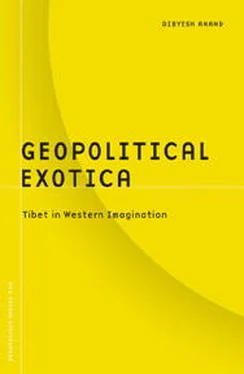"The archive is also a place of dreams" (Steedman 1998, 67). It reflects not only the achieved but also the achievable and dreams of achieving the nonachievable. Thus, Shangri-la is a repository- of mental peace, spiritual wisdom, "high" culture, and physical wealth. It is a storehouse of desires-Western desires that leave little room for the cultural and historical specificity of Tibet. Western travelers' search for the "real Tibet" often takes them beyond actual Tibetans:
The real Tibet I was searching for was not out in the open. It was not in the magnificent temples and palaces, in the colorful bazaars, in the happy and carefree life of its farmers or in the entrancing charm of Lhasa's social life. Real Tibet transcends politics and economics; it is invisible, beyond sense-perception, beyond intellect. It is the mysterious land of the psyche, of what lies beyond death, a universe to which some Tibetans have the key and which their subtle soul seems to have explored as thoroughly as Western scientists have explored our physical universe. (Riencourt 1950, 262)
Thus, integral to the Western imagination of Tibet has been a notion of utopia, beginning in the late nineteenth century with theosophists and taken to its extreme in Lost Horizon (see Bishop 1989; Dodin and Rather 2001b; Klieger 1997)-Tibet as a sanctuary from the materialism and violence of modern times, a sanctuary for those disaffected with modernity and seeking peace and wisdom. The twining of wisdom/archive/library with contemporary Tibet is seen in the sentiments of many Western [30]supporters of Tibet. Interestingly, the vice-chancellor of Oxford, in his welcome note to the first International Seminar on Tibetan Studies in 1979, quoted from Hilton's novel: "When the High Lama asked him [Conway] whether Shangri-La was not unique in his experience, and if the Western world could offer anything in the least like it, he answered with a smile: 'Well, yes-to be quite frank, it reminds me very slightly of Oxford'" (BOD MS Or. Aris 15 n.d., 99).
"Tibet" in the contemporary period emerged out of a colonial representational regime (discussed in chapter 2) and the archive has played a crucial role in producing and circumscribing this regime. The archive of imaginaries of Tibet shaped the ways in which Tibet was encountered and in turn (re)produced new imageries to be added on to the archive. An important force that constrained and shaped this encounter was European imperialism, particularly its British variant in India.
THE IMPERIAL SCRIPTING OF EXOTICA TIBET
Contemporary journalistic reports about Tibet usually start off with the history of the "drastic opening" of Tibet in 1950 with the Chinese invasion. This reveals a practice of historical amnesia, for they rarely mention the destabilizing influence of Western imperialism in pre- 1950s Tibet. [31]As the next chapter will argue in greater detail, the imagination of Tibet as a place and its historical status vis-a-vis China are linked through Western imaginative and imperial practices. Here, the focus is on analyzing the poetics of representation within a historical account written by a British colonial official-Colonel Francis Younghusband, who played an important role in one of the most crucial historical moments of the modern imperial scripting of Tibet in the international imaginary-the 1903-4 Tibet mission, more commonly known as the Younghusband mission. The analysis shows the intermeshing of knowledge, power, representations, and encounters within an imperial ethos.
The beginning of the twentieth century saw British imperialism in its heyday, firmly established on the Indian subcontinent. However, Tibet remained tantalizingly outside the arena of European scrutiny, for it was closed to foreigners. The Younghusband mission was designed to force the Tibetans to come into the modern international (read imperial) world. In terms of attitude toward Tibet, it was preceded and accompanied by a mix of abhorrence (with the "priest-ridden" system) and fascination (with the nature and simplicity of common people). This ambivalence remained integral to Exotica Tibet during the duration of British imperial rule on the Indian subcontinent. The image of Tibet one can glean from Younghusband's account is that of a backward, quaint people deserving the guiding hand of an enlightened British imperialism. This image is quite different from the idealization of Tibet (though not of Tibetans) as seen in Hilton's utopian archive.
An Imperial Adventurer
Younghusband's India and Tibet (1910) purports to provide a history of the relations that have existed between India and Tibet from the time of Warren Hastings (late eighteenth century) to 1910, with a particular account of the 1903-4 mission to Lhasa. This story of the British aims toward "the establishment of ordinary neighbourly intercourse with Tibet" (vii) and Tibetans' refusal to oblige.
Reflecting the attitude of a "pioneer" and "frontiersman," the account is full of resentment against bureaucratic and political control exercised by the imperial government over its agents. Younghusband expresses nostalgia for a golden era when the agents of imperialism were left free to pursue their "destiny" without interference. Sarcastic about the centralization of power in London, he says that "the next mission to Lhasa will in all probability be led by a clerk from the Foreign Office in London" (103). Reflecting an aristocratic disdain for "democracy," he says that "as long as what an officer in the heart of Asia may do is contingent on the 'will' of 'men in the street' of grimy manufacturing towns in the heart of England, so long as our action be slow, clumsy, and hesitating, when it ought to be sharp and decisive" (133).
Younghusband is very conscious of the importance of credibility in maintaining imperial rule. For him, it was important to combat Russian intrigue in Tibet, as its loss would have been perceived by bordering Asiatic powers as a sign of British weakness and Russian supremacy. When signing the treaty in Potala Palace, Younghusband ordered everyone to dress in full regalia in order to impress the Tibetans: "Those who have lived among Asiatics know that the fact of signing the treaty in the Potala was of as much value as the Treaty itself" (302). Troops lined the road to the Potala and "a battery to fire a salute or to bombard the Palace, as occasion might require, was stationed in a suitable position" (303).
The invasion was seen as an adventure: when Younghusband received the news that he was to go on the mission, he was elated- "Here, indeed, I felt was the chance of my life. I was once more alive. The thrill of adventure again ran through my veins" (96). About leaving Darjeeling for Chumbi, he writes, "To me there was nothing but the stir and thrill of an enterprise, which would ever live in history" (152). Reflecting a close relation between imperial adventures and scientific pursuits, he describes how at Khamba Jong, while some went out to shoot antelopes and Ovis ammon, others indulged in "botanizing or geologizing"; he himself went with "Mr Hayden to hunt for fossils, with Captain Walton to collect birds, and Colonel Prain to collect plants" (123). [32]
Imperialists were flexible (opportunist?) in their perception of natives. The latter were perceived as inherently divided or inherently united depending on the needs of the former. The deputation from Tashi Lama (with his seat of authority in Tashilunpo monastery in Shigatse, the second city of Tibet; he is usually seen as secondary to the Dalai Lama in temporal matters) pleaded innocence, and citing their fear of the wrath of the Lhasa government, requested Younghusband to withdraw to Yatung or across the frontier. Younghusband made it clear that "we must regard Tibetans as all one people, and hold them responsible for the actions of each" (124). Contrary to the self-perception of Tibetans, the British imposed a pan-Tibetan identity.
Читать дальше












